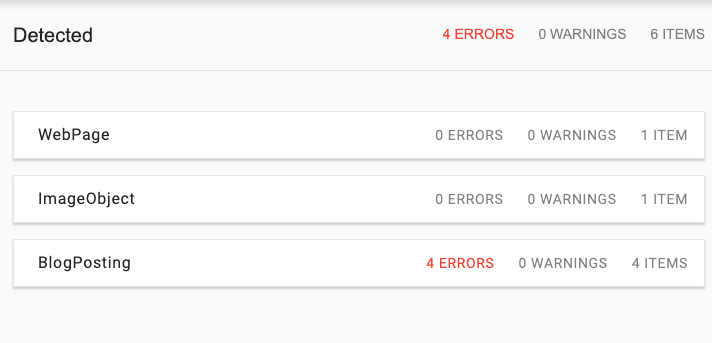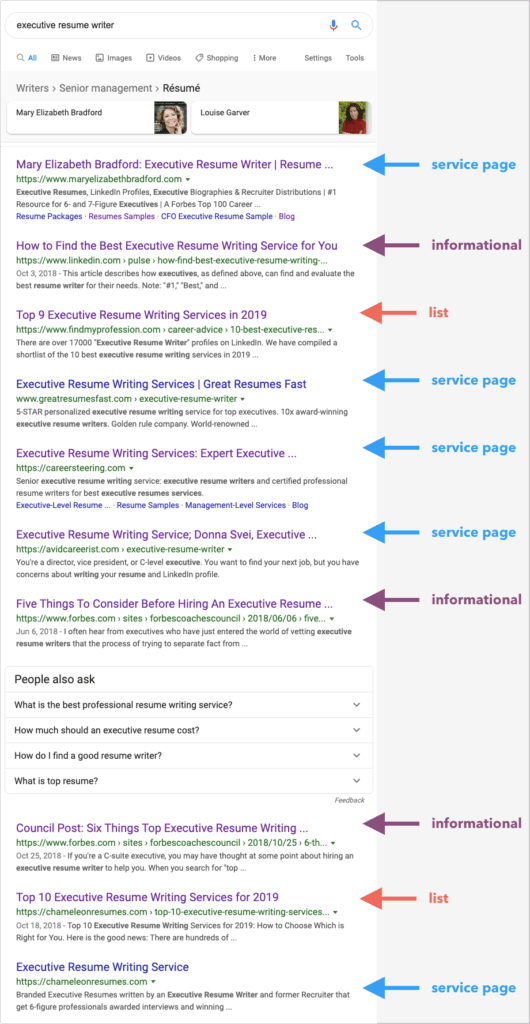Advanced User Intent and SERP Analysis
I recently came across a SERP feature I’ve never seen before. So far I’ve only seen it in one search query. But what it reveals is the increasingly important role content plays in demonstrating knowledge and expertise. To appear in this feature, you can’t just optimize your blog post.
There are four key takeaways from this post:
- Google has a SERP feature that can’t be manipulated and for which you cannot optimize.
- Search intent alignment is even more crucial than ever.
- Inclusion in this feature requires that Google recognizes your expertise.
- Stop thinking at the page level and start thinking holistically (what your site is about).
Let’s get started!
The Impact of a New SERP Feature on Content and SEO
Let’s take a look at an example of a new SERP feature that’s available on both desktop and mobile. It’s similar to the dynamic organization of Search results that Google revealed in a post last year.
Pay attention to the entry that appears at the very top, above the ads. Clicking on any of the words or the images rewrites the query and starts a new search.

So, you’re probably wondering how to optimize your page to get that coveted position. The short answer is you can’t. It doesn’t operate at the page level. We need to dig a lot deeper to understand what’s going on.
The SERP Feature is Powered Independently
Any tricks you’ve discovered to manipulate organic search rankings won’t work here. The algorithms behind this SERP feature work independently of those that surface the organic results, the ten blue links that appear below the advertisements.
How do I know this? It’s a reasonable assumption based on the observance that one of the two entries in the SERP feature, Louise Garver, does not even appear in the organic search listings.
This isn’t like a featured snippet.
Structured Data Won’t Help
It’s not a question of having the right structured data markup. That won’t help either. But let’s look at the structured data for both these SERP feature entries anyway.
The home page for Mary Elizabeth Bradford (in the first position of the organic search results) uses the Schema type ‘organization.’ But the search engine is looking for an entity that is a person, NOT an organization. Plus, they’re not looking for a page.

Louise Garver doesn’t even appear in the organic listings for this search term. Her home page contains six Schemas; one WebPage, one ImageObject, and four BlogPosting.

Structured data markup for BlogPosting schemas do reference Louis Garner as an author of the type ‘person’ so that might help.
The lesson here is that Google is sophisticated enough to make its own inferences. It doesn’t depend on structured data, which can be manipulated.
Page-Level Optimization Doesn’t Help
This SERP feature looks like an implementation of both the knowledge graph and the topic layer. There’s an order to this topic space – Writers > Senior management > Résumé. Also, Google has identified ‘executive resume writer’ as an entity of the type person, NOT organization, which makes sense.
That means organizations, like those appearing in the organic search results, have ZERO chance of making it into this SERP feature for the search term ‘executive resume writer.’ Remember, pages don’t make it into this SERP feature, but entities do.
Google has judged these two people, Mary Elizabeth Bradford and Louise Garver, to be the best representation of this specific topic/entity. It’s not about any one page. It’s about all the pages of content that tell a story that these two women are experts in their field. Interestingly enough, each woman has a knowledge panel associated with their respective entity.
Authority Optimization Makes The Difference
Getting into this SERP feature requires a concerted effort far beyond the page level. You need to establish yourself as a person who is an expert on this topic.
To be clear, I’m not talking about domain authority (DA).

A quick analysis confirms many domains ranking for this search term that have a higher domain authority than the two appearing in this SERP feature.
While we don’t know Google’s exact methodology, we can assume your online presence plays a critical role. Do you have the content and the recognition to be considered an expert in your field?
Both women, in this case, use the terms “executive,” “resume,” and “writer” in their social media profiles. They also have numerous (99+) recommendations for resume writing and related skills. Plus, both are certified resume writers.
What about their content?
They’re both prodigious authors of content on resume writing and its related topics. Their articles can be found both on their respective blogs and in the form of guest posts.
Mary Elizabeth Bradford frequently writes for well-known publications such as Forbes, which may contribute to her authority. As an aside, an analysis of these articles found their content scores to be below average – some food for thought.

Of course, we can’t all write for Forbes.
A quick analysis of some articles on Louise Garver’s site finds them to be significantly above average. Smart move! It makes sense to use your own site, of which you have total control, to establish authority on a specific topic.
The key point is that a body of well-written, comprehensive content is vital to building authority. Google’s topic layer has been “engineered to deeply understand a topic space.” It’s not a far stretch to believe that the search engine can also understand the content on your pages and evaluate its quality.
That’s why quality counts.
Advanced User Intent Analysis
But even the best content won’t rank for a particular term if it doesn’t match the search intent. In this example, the SERP feature presents a clear picture of two highly-authoritative writers on the subject. But the organic search results are another matter.

The intent is fractured – results show several company service pages, informational pages, and lists. I believe this SERP is in flux and may continue to be so for some time.
The algorithms driving the SERP feature have determined that the most relevant results to surface are people who Google recognizes as experts on this topic. The organic results, however, are a mishmash of service pages, informational pages, and lists.
SERPs are always in flux – some more so than others. This one may change as search engine algorithms reconcile the difference between intents. In the meantime, building up informational content relating to topics surrounding ‘executive resume writer’ would be a prudent approach.
Summary
This particular SERP feature indicates that page optimization isn’t the end, rather it’s only the beginning. There is no shortcut.
Inclusion in this search query feature is really about getting Google to recognize your expertise. For that, you’ll need sufficient high-quality content that demonstrates your knowledge of the topic.
Link those articles together in appropriate clusters of content that build on one another. Together they form the story of your topical proficiency.
Organizations won’t be candidates for terms where Google has established the entity to be a person, as in this particular example. But the opposite also holds true.
In the meantime, organizations can still rank in the organic SERPs. But to do that, you need to look past Google’s preferred intent. In this particular case, the ten blue links reveal a mixed intent, yet the SERP feature is clear.
Given that, plus the fact that 50% of the results are informational pages, continually optimizing your service page will yield limited results. The best strategy is to create content clusters around the topic. MarketMuse can help with that.
Stephen leads the content strategy blog for MarketMuse, an AI-powered Content Intelligence and Strategy Platform. You can connect with him on social or his personal blog.